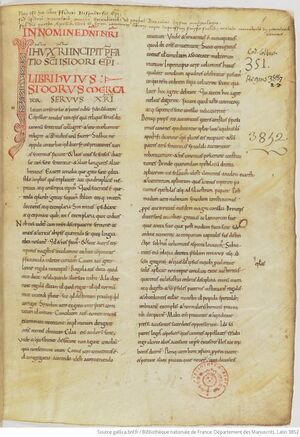Paris, BnF, lat. 3852
| Library | Bibliothèque nationale de France |
|---|---|
| Shelfmark | lat. 3852 |
| Century | s. XI-XII |
| Provenance | ? |
| General region of origin | Angers |
| Collection | Collectio XXX capitulorum (De ratione matrimonii) |
| Collection 2 | [[Pseudoisidore, False Decretals]] |
| Author | Bruno Schalekamp |
Paris, Bibliothèque nationale de France, lat. 3852 is an eleventh or twelfth-century manuscript of 238 folios (1-236 + 6bis and 6ter) in 2 cols. (355 x 265 mm (300 x 205 mm)). It is made of parchment. Its codicological composition reads as follows: 31 quires: (III + 2)8 + 7 x IV64 + II68 + 4 x IV100 + II104 + IV112 + (IV – 2)118 + IV126 + (IV – 1)133 + (IV + 1)142 + 2 x IV158 + (IV + 1)167 + (IV + 2)178 + 3 x IV202 + (IV – 1)209 + IV217 + (IV – 1)224 + IV232 + II236, quire signatures on every verso side of the last folio of quires 1 through 8 (I-VIII), 10-28 (XI-XXVIIII) and 30 (XXXI). Modern foliation in Arabic numerals on every recto side. It was written by multiple hands, all with in the particular Angers-script in late Caroline minuscule. The manuscript's origins are from Angers according to Kéry. Its provenance is only first documented first documented as part of Jacques-Auguste de Thou’s (1553-1617) library, later purchased by Étienne Baluze (1630-1718) for Jean-Baptiste Colbert’s (1619-1683) personal library. In 1732 transferred to the Bibliothèque du Roi together with the colbertine collection.
Contents
Paris lat. 3852 is a large and bulky manuscript and contains almost exclusively canonical material. This composition is mostly dominated by Pseudoisidore's False Decretals. Another collection, the Collectio XXX capitulorum (De ratione matrimonii), has been split up into two separate parts, in which St. Augustine strikingly functions as the introductory authority of the second part. The codex also includes two decretals by pope Gelasian I, as well as several decretals by Symmachus. Lastly, an unknown ordo on the excommunication of infidels is included and - being the only non-canonical material - a version of the Notitia Galliarum.

The codex is a well-preserved work, with structured columns and Roman numbering of canons. It houses some elaborate capitals, such as the one showed here. Some minor marginalia can be found in both medieval and early modern hands, mostly explaining the contents or adding terminology to inform the reader, as well as adding lines to what can only assumed to have been lacunae. The medieval writers seem to have had the upper hand here, as the early modern hand (maybe Baluze's?) focused to clarify this codex was not actually Isidore de Seville's work, but Pseudoisidore. Interestingly, this is explicitly mentioned on fol. 1r: Non est hic liber Isidori Hispalensis Episcopi, sed Isidori mercatibus (?).... It seems this had to be spelled out clearly for the reader, even though Isidorus Mercator Servuus Christi is mentioned a few lines down in the same column. The codex, therefore, probably interestingly sparked some discussion in early modern circles about the origin of the canonical material included.
See the digitized version: https://gallica.bnf.fr/ark:/12148/btv1b105452787.
| folios | texts |
|---|---|
| Front cover and four flyleaves | |
| Ir-v | Blank pages |
| 1ra-2rb | Pseudoisidore's False Decretals, praefatio |
| 2va-3ra | Collectio XXX capitulorum (De ratione matrimonii) |
| 3ra-68vb | Pseudoisidore's False Decretals, first volume (epistolae pseudographae) |
| 68vb | Collectio XXX capitulorum (De ratione matrimonii), here introduced as 'St. Augustine on matrimony' |
| 69ra-220rb | Pseudoisidore's False Decretals, third volume |
| 220rb-224ra | Decretal of pope Gelasian I (no. 636, chapters 1-28) |
| 224v | Blank page |
| 225ra-231ra | Multiple decretals of pope Symmachus |
| 232va-234ra | Decretal of pope Gelasian I, titled De Damnatione Acatii |
| 234ra-vb | Ordo qualiter episcopus excommunicare debet infideles |
| 235r-236v | Blank pages |
| Three flyleaves and back cover |
Literature
Jasper and Fuhrmann, Papal Letters (2001), p. 178 n. 154; Kéry, Canonical Collections (1999), p. 76, 82, and 103; Reynolds, Studies on Medieval Liturgical and Legal Manuscripts (2009), cited in sources; Rohr, Der Theoderich-Panegyricus des Ennodius (1995), p. 145; Williams, Codices Pseudo-Isidoriani (1971), p. 55, 66, 109, 113-114, 123, 125, 128, 129, and 131.
An edition of the Collectio XXX capitulorum (De ratione matrimonii) is currently being prepared by Sven Meeder, Gideon de Jong, and Bruno Schalekamp.
